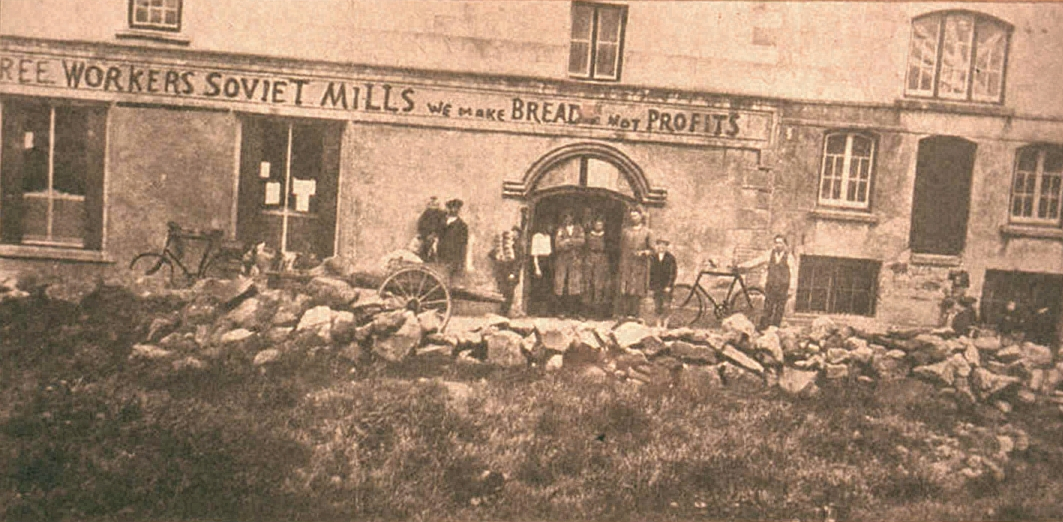The recent shootings in Sandy Hook, Newtown, Connecticut have made many question the role of guns in American society. This is a sharp contrast the Ireland where we have so few guns that even the police are unarmed. To an American this must seem like madness or liberalism run wild, but it actually works very well. In fact it is a policy that is universally supported across the political spectrum and among commentators. Instead of relying on the threat of violence, they rely upon their authority and consent of the people. As a result, the police force is one of the few institutions in Irish society that people still trust and respect. The reason the Irish police (generally referred to … Continue reading “Unarmed Police”
Tag: Politics
Irish Soviets 1919-23
Workers throwing out the boss, hoisting a red flag and proclaiming a Soviet are not something that you would normally associate with Irish history. That sort of stuff is normally presumed to have happened in Europe but not Ireland. Most history books describe all Irish people as being united with the sole aim of driving the British out. Yet Ireland was caught in a wave of Socialism similar to that in Italy and France. During the War of Independence over 100 Soviets were set up in Ireland. Although it is now forgotten, many thought Bolshevism was a greater threat to British rule than Sinn Fein. All across Europe there were strikes and revolutions. The mass slaughter of the First World … Continue reading “Irish Soviets 1919-23”
Misunderstanding Hayek And The Road To Serfdom
“The Road To Serfdom” by Fredrick Hayek is a disappointing book. Conservative bloggers often race about it claiming it has great insights into modern politics. While I disagree with the Austrian school of economics I read it to here the other point of view. I found it a boring, out dated book that didn’t have anything particularly original or insightful to say. It’s mainly concerned with saying a totalitarian state where the government controls everything doesn’t work (you don’t say). The book might have been relevant when it was published, but I am at a loss to see its use today. I think to a large extent Hayek has been misunderstood. I have regularly heard people use Hayek to criticize … Continue reading “Misunderstanding Hayek And The Road To Serfdom”
The Mythical Laffer Curve
Conservatives everywhere condemn the use of tax increases for fear of the Laffer Curve. This is the idea that if taxes are too high, people will lose the incentive to work and therefore revenue will actually decrease. It is most famous for its counter-intuitive argument that a tax cut could increase revenue. Unfortunately there is little or no evidence to support this claim. History clearly shows that cutting taxes does not increase revenue. The Laffer curve is a political idea used to justify tax cuts for the rich. It is not based on sound economics. Most economists know the Laffer Curve isn’t true. An IGM survey of economists found that not a single one of them agreed that a tax … Continue reading “The Mythical Laffer Curve”
The Euro: It Seemed Like A Good Idea At The Time
Ten years ago most countries of the European Union abolished their individual currencies in favour of one regional currency, the Euro. There were celebrations and rejoicing at a further step towards European integration and co-operation. It was proclaimed that this would lead to peace and prosperity. Most people gave it little thought beyond the fact it would be handy to use the home currency abroad on holidays. Very little consideration was given to the economic effects the currency might have. Rather it was presumed Europe could only benefit from a single currency. Ten years on and the Euro is facing widespread and possibly even collapse. Where did it go wrong? In a nutshell, the Euro is in trouble because European … Continue reading “The Euro: It Seemed Like A Good Idea At The Time”
Laissez Faire And The Irish Great Famine
Right wing libertarian politics have never really caught on in Ireland. Part of this is due to the memory of the Great Famine of 1845-8. The Famine, though caused by blight, was made worse by the prevailing conservative doctrine of laissez faire. This was the prime example of politicians believing the free market will solve everything, that it would be unethical for the government to intervene and that helping the poor would only make them lazy and dependent. This was an experiment of a world with only minimal government, of free market principles in practice, the result was so disastrous that a million people died. The normal market is governed by supply and demand. Goods are sold to whoever will … Continue reading “Laissez Faire And The Irish Great Famine”

